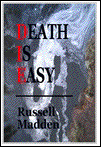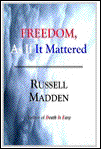 |
 |
|
|
 |
 |
|
|
As L. Neil Smith is wont to say, it always comes down to guns. How a person feels about the right of individuals to defend themselves frequently serves as a symbol or condensation of how he views freedom, in general.
If this principle is valid, then F. Paul Wilson's Repairman Jack values liberty more than any other character you are likely to encounter in today's mass-market fiction. Guns and how they are used form a central theme in Jack's most recent outing in the Cycle of the Adversary. Wilson's latest novel, Hosts, also provides new insights into Jack's personality and the forces driving him.
Jack steps onto the stage while riding on the New York City subway. Viewed through the eyes of a young reporter, Sandy Palmer, the Repairman is doing what he does best: minding his own business. When a crazed gunman decides that "It's time now!" (p. 12), Jack must act to save his own life and those of his fellow passengers...because no one else will.
He is not happy about that fact:
In Hosts, Jack makes it even clearer than in past stories that he is no vigilante. He does not live an "other oriented" life. In Objectivist parlance, he is the anti-thesis of a "social metaphysician." He does aid folks who have nowhere else to turn, but he takes on "repair" assignments only when they meet his strict criteria...and only for hefty fees. In no way does he go out of his way to help strangers, roaming the streets and seeking out criminals like Charles Bronson in his "Death Wish" movies.
After stopping a purse snatcher on a bicycle, he explains to Sandy Palmer why he did not sit idly by as the criminal passed:
Jack does not believe in sacrifices. He does, however, practice personal responsibility. Following the best understanding of that phrase, he knows that a decent human being is not fundamentally anti-social, does not view his fellow citizens in any Nietzschean sense. In the subway car full of people, he became angry because no one other than he was prepared and willing to stop a direct threat to the peace and to human lives. In the park, however, he accepted and reacted on the basis of being the only person in a position able to respond; he did not "let Joe do it."
When the reporter fails to comprehend Jack's motives, the Repairman says:
In other words, if every person simply dealt with the problems directly in front of him, there would be no need for broad "social" solutions and innumerable laws and regulations stealing our money and forcing us down mandated pathways. If every person accepted responsibility for his own life and, as it were, picked up the litter in his own yard, there would be no need for anti-littering laws.
In well-crafted contrast to Jack, however, stands Sandy Palmer, a no-name flunky working for the weekly tabloid, The Light. He is consumed with how others view him. He is a true "second-hander." What he seeks is not personal fulfillment but fame and recognition. The approval of others, not a quest for achievement, drives him forward. Exclusive parties, movie deals, having a pretty woman on his arm: his motivations are all external to his self.
While possessing a certain naive innocence and appeal, Sandy rationalizes his exploitation of Jack by convincing himself he will "help" Jack. He epitomizes the kind of do-gooders rampant in politics and society today who butt-in "for your own good." As with the old saying, "I'm from the government, and I'm here to help," Sandy's "aid" is akin to "destroying the village in order to save it" as happened in Vietnam. Jack wants no part of the eager reporter but is forced to deal with this man who unwittingly holds Jack's life of freedom in his fumbling fingers.
Though he does not understand Jack or the context in which the Repairman operates, Sandy is, in essence, seeking to "out" him to society and the authorities. A similar dilemma confronts Jack's sister, Kate Iverson, a pediatrician whom Jack has not seen in fifteen years.
Through what appears to be a coincidence but is not, Kate elicits Jack's help in discovering why her lesbian lover, Jeanette Vega, has grown cold and indifferent after an apparently successful treatment for brain cancer. Kate is, at first, reluctant to involve Jack. Having realized her true sexual nature in Jeanette's arms, Kate wrestles with keeping that secret hidden. She fears that involving Jack in her problem will expose who she is to her husband, her teenage children, and her patients.
It is through Kate's eyes, however, that we peel back another layer of Jack's persona. The shift from Jack's troubled youth to his manhood reveals more reasons he feels so out of place in the modern world:
There are still people who share Jack's values, but the disdain or amused condescension such traits receive from so many in today's society illustrate how rare such individuals are...and why Jack does not believe Sandy's exorbitant dreams of glamor and public appreciation for the "Six-Gun Savior":
Jack comprehends the nature of the system whose clutches he seeks so diligently to avoid. The State (and the Adversary...) grows bolder in its depredations with each passing year. As Jack's friend, Abe Grossman, proprietor of Isher Sports Shop, says:
Sandy is not as blatant or self-aware in his exploitation of this shooting tragedy as are the politicians, but the basic impulse -- and moral fault -- remains the same. "Good intentions" are not sufficient to excuse his excesses...nor those of the politicians. As Abe points out:
Unlike the police and other authorities who want to prosecute the "Savior," i.e., Jack, Abe appreciates and repeats Robert Heinlein's dictum that an armed society is a polite society.
Despite the threat Sandy's ambitions present to Jack, the more fundamental danger is the force gradually and inexorably ensnaring Kate, Jeanette, Jack, and others in its amorphous tentacles: the Unity, a tool of the Adversary:
There will be no cars, no banks, no stock market, no money, no trade, no art, no literature, no entertainment. What there will be is:
From this eerie echo of collectivism and communism drips the poisonous essence of deepest evil, a vile corruption Jack has battled in the past and will face at its strongest in Nightworld. Disguised in the cloak of compassion and the fantasy of unconditional love, this ultimate parasite violates the core of Jack's soul. For him:
In the clash between these two mutually exclusive and contradictory frameworks for life and society lies the foundation for one of the most terrifying conflicts Jack has ever faced. The contest will not be an easy one...
I read Host in two days. With a more intimate threat to Jack involved in this story than in, say, All the Rage or Conspiracies, this story pulled me swiftly along as the Repairman dealt with the perils confronting himself and his sister. Eagerly, almost impatiently, I looked forward to each of his appearances on the page. With forceful logic, the plot lines merge as Jack races to defeat a danger capable of destroying his dearest personal values...and civilization itself.
Hosts can be read on one level as a suspense novel of creeping horror. On another level, lovers of liberty will appreciate both the direct appeals to freedom as well as the broader symbolism embodied in the characters and situations Jack faces with characteristic bravery and ingenuity.
As Ayn Rand pointed out, the best fiction provides "emotional fuel" for those who read it. In a sometimes gonzo world where the bizarre and the chaotic have become commonplace, more than ever we need a hero we can admire and a story to involve us; a brief respite from our work-a-day travails and routines. F. Paul Wilson provides us with both in the person of Repairman Jack and his latest adventures in Hosts.
Don't deprive yourself by waiting for the mass-market publication. Buy it now. Recharge your emotional batteries. Sit back. Read it. Enjoy.
You deserve it.